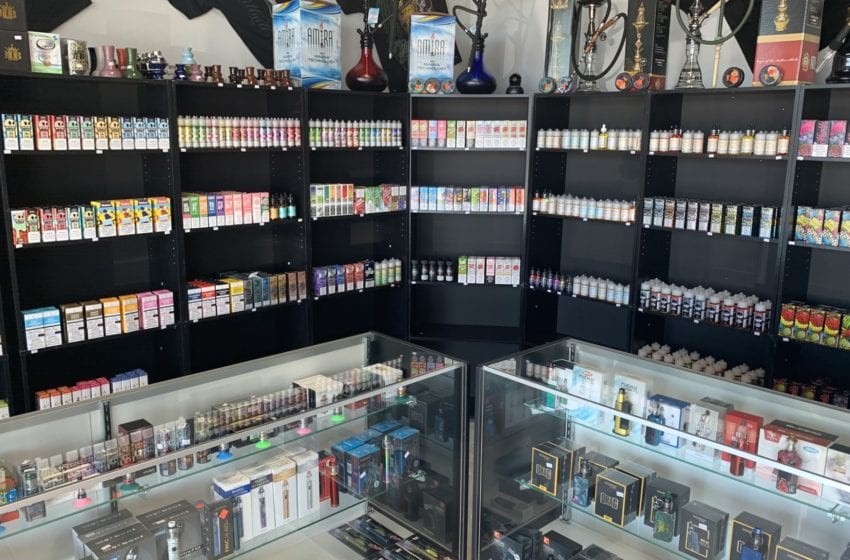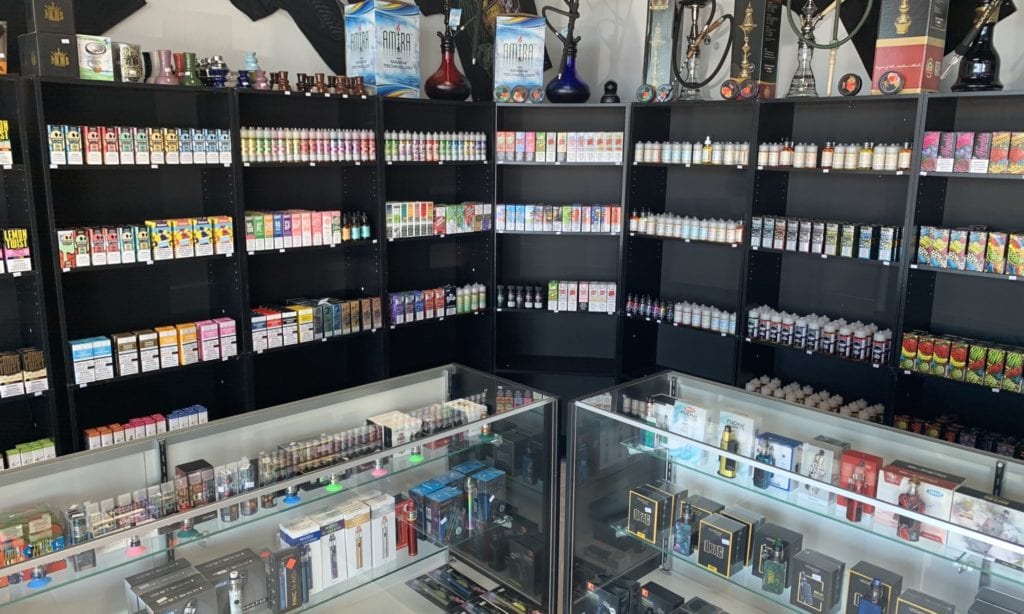Restrictive Sales
- News This Week Shop talk This Issue VV Exclusive
- October 22, 2020
- 13 minutes read

Credit: Overland Park Vape Shop

The regulatory wave is crashing down on internet ENDS retailers.
By Nicholas A. Ramos, Agustin E. Rodriguez and Bryan M. Haynes
Online businesses selling electronic nicotine delivery systems (ENDS) to consumers must contend with a “patchwork quilt” of state laws. This patchwork of laws creates significant regulatory uncertainty and risk for businesses selling online in this space. There are many legal issues facing online retailers, like bans or restrictions on “flavored” tobacco products, minimum age and age-verification requirements, and state and local licensing and tax requirements. This article discusses some of the key legal issues associated with selling ENDS to consumers online and highlights proposed state legislation that may impose more requirements on the industry.
State licensing
Online retailers looking to comply with the myriad of state laws should first look at the states in which consumers purchase their products and, for each state, identify potentially applicable licensing laws. States may require licensing or registration under tax laws, health and welfare laws, and/or general business laws before online retailers may sell to consumers in their states. Idaho, for example, requires licenses from its Department of Health and Welfare to prevent youth access to tobacco products and electronic smoking devices. Washington, D.C., however, requires a basic business license from its Department of Consumer and Regulatory Affairs.
In addition, online retailers of ENDS should determine whether state licensing law definitions actually cover their products. While states have required licenses for the sale of tobacco products for years, they have only recently added definitions of ENDS to their licensing statutes. ENDS may be covered under licensing laws either because the category is explicitly defined, or the definition of tobacco products is broad enough to cover ENDS products.

Online retailers should also determine whether state licensing laws actually cover remote sales. Some states only require licenses for retailers that have a “place of business” or “business location” in their states. Hawaii, for example, is unique in that it requires ENDS retailers to obtain a registration from the Hawaii Attorney General. At this time, however, the Attorney General only requires retailers to register if they are located in the State, which excludes out-of-state online retailers.
It is also important to keep in mind that most state laws regulating ENDS were only passed within the last 3-5 years. Many of those new laws simply amended existing tobacco product laws, and legislatures may not have carefully incorporated those changes in all of the critical statutory sections. Consequently, there are often situations in which the legal requirements are not clear. In those cases, it may be prudent to reach out to regulators to better understand how they interpret their statutes.
State taxes
When online retailers face ambiguous licensing laws, it may be helpful to look to the purpose of those laws. For example, if licenses are required by a tax department, the online retailer should look at the tax statute to determine who and what is subject to taxes. Many states require licenses to facilitate payment of sales or excise taxes.
Almost all states impose sales and use taxes on remote sales of products. For out-of-state online retailers, most states follow the analysis outlined in South Dakota v. Wayfair, Inc., 138 S. Ct. 2080 (2018), which generally permits a state to impose sales tax on an out-of-state seller where the seller has a “substantial nexus with the taxing State.” Some states require a business or tax registration to file returns and pay sales taxes.
Missouri, for example, does not tax or regulate ENDS as tobacco products, but it requires online retailers to obtain a retail sales tax license for sales tax purposes. Furthermore, states typically only require sales taxes from remote sellers when a certain sales volume or revenue threshold has been met. Virginia, for example, requires a remote seller to register for the collection of sales and use tax if it received more than $100,000 in gross revenue from sales in Virginia or engaged in 200 or more separate retail sales transactions during the previous or current calendar year.
In addition, like state licensing laws, the applicability of excise taxes to ENDS products sold online can depend on the specific product definitions in the relevant statutes. Some states’ excise tax statutes explicitly define and include ENDS products, while others attempt to fit those definitions into terms like “tobacco products” or “other tobacco products.” Utah, for example, explicitly taxes “electronic cigarette substances,” “prefilled electronic cigarettes,” “alternative nicotine products,” “nontherapeutic nicotine device substances,” and “prefilled nontherapeutic nicotine devices” in its Electronic Cigarette and Nicotine Product Licensing and Taxation Act.

Some states explicitly exclude ENDS from definitions that would subject them to excise taxes. Texas, for example, provides defines taxable “tobacco products” to exclude e-cigarettes, or any other device that simulates smoking using a mechanical heating element, battery, or electronic circuit to deliver nicotine or other substances through inhalation.
It is also important to keep in mind that states tax various parts of ENDS products in different ways. Virginia, for example, imposes an excise tax on liquid nicotine products at the rate of $0.066 per milliliter of liquid nicotine, but the State does not impose taxes on other components of ENDS. Washington, D.C., on the other hand, taxes vapor products by making the tax rate equal to the cigarette tax, expressed as a percentage of the average wholesale price of a pack of 20 cigarettes.
Finally, if online retailers determine state excise tax laws apply to their ENDS products, they must still determine who is required to pay those taxes and when they are due. For example, some states, like Kentucky, require that excise taxes be paid by the licensed distributor that first possesses the ENDS products for sale to a retailer or unlicensed person in the State.
Potential penalties & enforcement climates
Online retailers facing ambiguous licensing statutes should consider two major factors in their risk analysis—statutory penalty provisions and enforcement climate.
Penalties for operating without a license can be steep. In Idaho, for example, it is a criminal offense to sell ENDS without a permit issued by the Department of Health and Welfare. In addition, a court may impose a fine of $1,000 per day beginning the day following the date of citation as long as the illegal ENDS sales continue. In other states, however, penalties are relatively low. In Montana, for example, failure to obtain a vapor product license is punishable by a civil penalty of $100.
Finally, online retailers should consider the enforcement climate surrounding regulation of ENDS products in certain states. For example, Attorneys General in various states have filed lawsuits against an ENDS manufacturers and online retailers. Although these cases do not directly implicate licensing or tax issues, enforcement actions by Attorneys General may suggest a more aggressive enforcement climate when it comes to licensing or tax violations.
Proposed state legislation
Online retailers should expect upcoming state legislative sessions to be fairly active with regard to regulation of ENDS products. In Colorado, for example, there is no current nicotine products or ENDS tax or licensing scheme. But Colorado HB20-1472 established a voter referendum on whether there should be a tax on “nicotine products,” which would include “products that contain nicotine and that are ingested into the body.”

In Georgia, the legislature is considering a bill that will amend its tax and revenue laws “to provide for excise taxes to be levied on certain alternative nicotine products and vapor products” and to “require licensure of importers, manufacturers, distributors, and dealers of alternative nicotine products or vapor products.” HB 1229.
South Carolina is also considering a bill (H.4714) that will “provide for the levying, assessment, collection, and payment of certain taxes on vapor products.”
These are just a few examples of states that are considering ways to regulate and tax ENDS products. Therefore, it is important for online retailers to incorporate accurate state legislative tracking into their compliance strategies.
Conclusion
As with any other new technology, the law is often playing catch up with new business models and products, like the online sale of ENDS products. But given the issues discussed above, online retailers should prioritize compliance with varying state laws to reduce the risks of enforcement action.
Nicholas A. Ramos is an associate with Troutman Pepper. His practical advice enables clients to navigate regulatory compliance and licensing issues, complex investigations, and high stakes enforcement actions that arise under state and federal law.
Agustin E. Rodriguez serves as counsel for Troutman Pepper and has almost two decades of experience counseling tobacco companies in-house and in private practice on tobacco product regulation, taxation and multi-jurisdictional state and local enforcement issues.
Bryan M. Haynes is a partner with Troutman Pepper who specializes in tobacco industry regulatory compliance and enforcement matters. He efficiently assists clients in complying with regulatory obligations and managing risk, consistent with clients’ business objectives.
